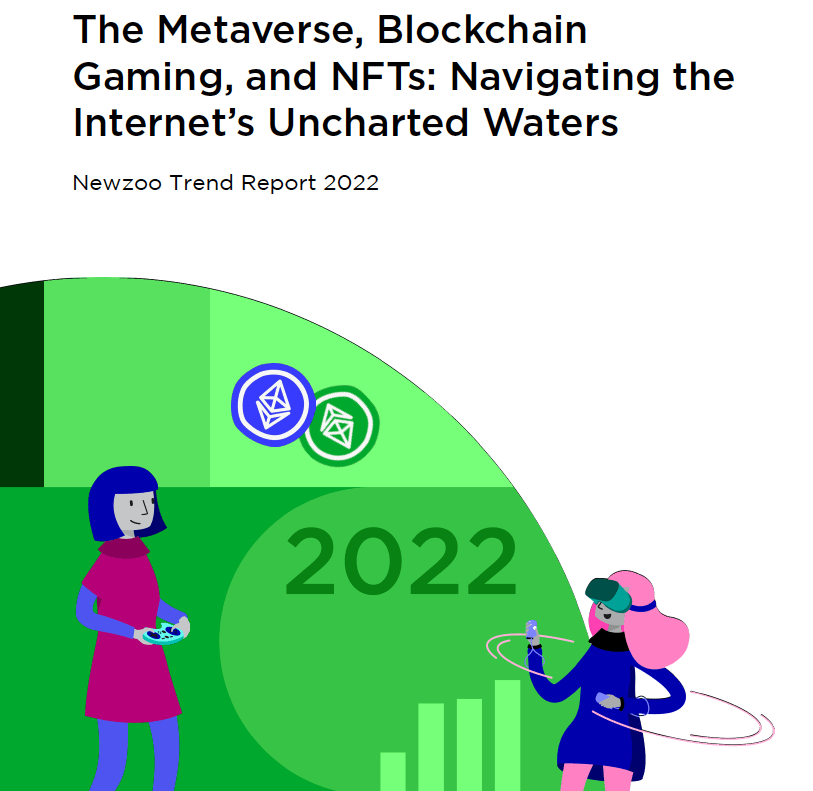Gaming, esports and metaverse trends 2022
Newzoo, the digital research company, has released its gaming, esports, live streaming, and metaverse trends 2022 report. It takes each area and identifies the top five trends to look out for this year.
The main findings of the gaming, esports, live streaming, and metaverse trends 2022 report are detailed below.
Gaming
- Play-to-earn will become a more viable business model – The idea of gamers making money from playing games is nothing new. Historically, such monetisation attempts from players have been against publishers’ terms of service. Companies were unwilling to moderate and regulate player-to-player trading.However, things are changing. Hype around NFTs and success stories such as Axie Infinity mean many AAA publishers strive to legitimise play-to-player trading. Results so far have been mixed.
- Metaverse anticipation will drive both investment and VR sales – While the metaverse future envisioned by Tim Sweeney and Mark Zuckerberg won’t be a reality for years to come, the seeds planted by these companies will begin to sprout in 2022.While metaverse buzz will drive investment and consumer spending on VR this year, it will take time for companies to implement an integrated, virtually connected world. To that end, the metaverse gold rush will begin to hit critical mass in 2022.
- Apple and Google will open their closed App Store ecosystems – Expect to see both Google and Apple opening their ecosystems to some extent due to fallout from last year’s Epic vs Apple lawsuit. The judge enforced stricter rules on anti-steering policies, but the enforcement is currently on hold. App store anti-steering policies have historically stopped publishers from advertising alternate payment systems outside the platform holder’s ecosystem.These changes mean Google and Apple will have to open up their ecosystems to consumers and publishers – not entirely but to some extent.
- Game IP values will spike as transmedia becomes more relevant – Hollywood previously struggled to adapt gaming IP into other media successfully. But recently, a slew of high-quality, commercially successful adaptations have been seen. These movies, TV shows, and cross-game promotions have effectively portrayed stories, characters, and themes.We will continue to see publishers emphasise building new game-related IP and crossing game IP into other media in 2022 and beyond.
- Gamers will be spoilt for choice – This year is on track to be gaming’s biggest yet, certainly in terms of spending but also in terms of content across console, PC, and mobile alike. COVID-19-related delays have inadvertently led to one of the most crowded and exciting gaming release calendars in recent memory.
Esports and streaming
- Blockchain will become more prominent in esports as organisations continue to diversify revenue streams – the esports market relies heavily on sponsorship, accounting for almost 60% of esports revenues last year Companies are therefore striving to diversify their revenue streams. To that end, teams and organisers are increasingly exploring ways to monetize fans directly.Many are eyeing blockchain tech and NFTs to achieve these goals, and we’re already starting to see new esports business models emerge. So far, esports audiences have been largely positive about blockchain and NFTs, whilst gamers have notably had the opposite reaction.
- Mobile esports will continue to grow as the biggest publishers fight for dominance – while mobile esports is quickly making a name for itself in growth markets across Latin America and Southeast Asia, more mature markets are also getting involved as new mobile games enter the market with an esports focus.
- The lines between esports and traditional sports continue to blur – the synergies between esports and traditional sports are becoming more apparent as each tests the other’s waters. Esports teams are evolving into lifestyle brands, and teams are dabbling in music, skateboarding, rollerblading, and chess. Organisers are tapping into new audiences by partnering with content creators and organisations across these non-gaming areas. Esports companies are now even starting to move into traditional sports themselves. An example is esports team EVOS, which recently announced a real-world basketball team.
- Co-streaming will grow into a common marketing strategy for brands, even those outside of gaming and esports – co-streaming is a proven tool for publishers and organisers to grow their total addressable audience exponentially. At the same time, allowing co-streaming is more transparent and shows trust in the content. Results have been promising so far.This year, expect co-streaming to become a key component in the media mix strategy. Following Arcane’s success, we expect to see co-streaming for future Netflix show launches particularly those that overlap with the gaming community.
- Live streaming platforms will become even more interactive – in 2021, the interactive show Rival Peak took Facebook Gaming by storm, generating over 100 million minutes watched in just three months. The show featured AI-controlled contestants. Viewers from over 70 countries could help these virtual contestants solve puzzles and help them progress. Experiences like this leverage two of live streaming’s strongest pillars, immediacy, and community.In the next 12 months, we expect more platforms and publishers to announce live streaming first solutions leveraging creator-viewer interaction. Such experiences will help make the broadcasts more engaging and memorable, providing additional avenues for directly monetising fans.
Metaverse trends
- Many consumers will begin to accept blockchain gaming as the market addresses pain points – Growing pains aside, titles like Axie Infinity have catalysed a new wave of blockchain game development. These success stories have shifted blockchain games from an unproven concept to a reality on which other companies can iterate.
- Metaverse investment and M&A will accelerate in 2022 – the metaverse is young, and its growth potential appeals to investors. This means venture capital flows into the metaverse market, with more investments happening seemingly every week.As the metaverse is such a young market, Web 3.0 developers are cheaper to invest in now than in the future. We believe bigger companies will strike in 2022 when the M&A irons are hot.
- NFT companies will become luxury and lifestyle brands – exposure from influencers is increasing consumer demand for NFTs, both among the extremely wealthy and the wider public, echoing the traditional luxury fashion market. These exclusive NFTs will serve as status symbols to consumers.Social media platforms are also embracing the technology. Twitter Blue subscribers can now display their NFTs on their profiles. The move makes sense, as Twitter is the go-to platform for many crypto and NFT enthusiasts. Twitter can monetise these fans all while exposing NFTs to a wider audience.
- Fashion brands will be the early winners in the metaverse – clothing brands play a huge role in shaping the early stages of digital identity. After all, digital expression via avatars is an important part of a player’s virtual identity.
- Metaverse growth, and FOMO, will result in brands buying virtual real estate – virtual land allows companies to build interactive experiences in the metaverse for consumers.We expect to see even more brands getting involved in 2022 and beyond. After all, some of the biggest tech companies in the world are doubling down on metaverses (and VR headsets to enter them). The brand gold rush for virtual real estate is only just beginning.
Download the gaming, esports and metaverse trends 2022 report
Click here to download the gaming, esports, live streaming, and metaverse trends 2022 report. You may also be interested in the metaverse, blockchain gaming, and NFTs trend report 2022. Click here to learn more.
If you’re looking for advice from an esports or gaming agency, Strive Sponsorship can help. Contact us for esports, sports, sponsorship, commercial, content, media, operations, investment, and communications consultancy services.
Frequently asked questions
Why is the metaverse trending?
“The Metaverse is not simply immersive virtual reality or a really cool video game. It’s a combination of technologies that allows an unlimited number of users to experience real-time rendered, 3D virtual worlds synchronously and persistently” (Matthew Ball).
Web 3 technology is now being used to create elements of what might become the metaverse. As such it is entering the public consciousness on a bigger scale.
What is the future of metaverse?
As Matthew Ball says, “It is difficult to predict how the Metaverse will evolve, just as it was nearly impossible to predict the emergence of Facebook during the era of Windows 95. The Metaverse will not replace the internet, but will build upon and extend it.”
Is metaverse a technology trend?
The metaverse isn’t a trend, it is a combination of technologies that will continue to evolve.














